

Cartoons stereotype women too. Avoiding Gender Stereotypes. How Kids Understand Gender.
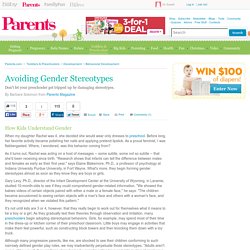
Girl and boy toys: Childhood preferences for gendered toys are not innate. Caught on camera in the "pink aisle" of a U.S. toy store, 5-year-old Riley posed a multibillion-dollar question: "Why does all the girls have to buy pink stuff and all the boys have to buy different colored stuff?
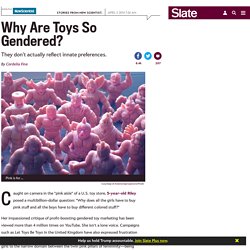
" Her impassioned critique of profit-boosting gendered toy marketing has been viewed more than 4 million times on YouTube. She isn't a lone voice. Campaigns such as Let Toys Be Toys in the United Kingdom have also expressed frustration at the way manufacturers and shops have increasingly restricted the interests of girls to the narrow domain between the twin pink pillars of femininity—being caring and being pretty—while the broader, "different colored" terrain is for boys. The group has recently expanded its focus to include books after the publication of titles such as The Brilliant Boys' Coloring Book and The Beautiful Girls' Coloring Book. List of Gender Stereotypes. Simply put, gender stereotypes are generalizations about the roles of each gender.
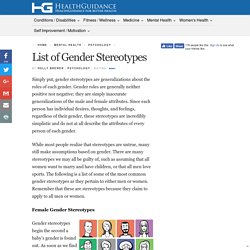
Gender roles are generally neither positive nor negative; they are simply inaccurate generalizations of the male and female attributes. The Debate On Lowering The Drinking Age. Last fall, a group of over 100 college presidents - including the heads of Dartmouth, Virginia Tech and Duke - signed a declaration stating that the 21-year-old drinking age is not working, and fireworks went off.
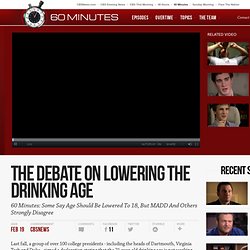
But the college presidents got what they wanted: a national debate about the drinking age. When the age was raised to 21 in the mid-1980s, the goal was to reduce highway fatalities. But everyone knows that the 21 age limit hasn't stopped minors from drinking. And now some experts believe it's actually contributing to an increase in extreme drinking. Lower the U.S. Drinking Age to Reduce Binge Drinking and Sexual Assault. I was telling my college-age daughter recently that back in the olden days when I went to college, you could fill a red Solo cup with beer at a fraternity party and sip it all night long.
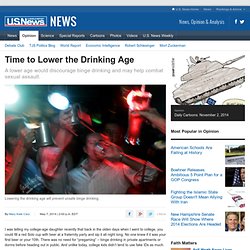
No one knew if it was your first beer or your 10th. There was no need for “pregaming” – binge drinking in private apartments or dorms before heading out in public. And unlike today, college kids didn’t tend to use fake IDs as much. Should the U.S. lower its drinking age? Your video will begin momentarily.
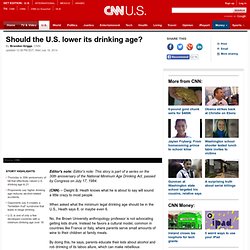
Thursday is 30th anniversary of bill that effectively raised U.S. drinking age to 21Proponents say higher drinking age reduces alcohol-related accidentsOpponents say it creates a "forbidden fruit" syndrome that leads to binge drinkingU.S. is one of only a few developed countries with a minimum drinking age over 18 Editor's note: Editor's note: This story is part of a series on the 30th anniversary of the National Minimum Age Drinking Act, passed by Congress on July 17, 1984. (CNN) -- Dwight B. Heath knows what he is about to say will sound a little crazy to most people. When asked what the minimum legal drinking age should be in the U.S., Heath says 8, or maybe even 6. No, the Brown University anthropology professor is not advocating getting kids drunk. "In general, the younger people start to drink the safer they are," said Heath, who has written several books and hundreds of scholarly articles on cultural attitudes towards alcohol.
Drinking Age ProCon.org. Should the drinking age be raised? Should Drinking Age Stay at 21? With the citation of President Bush's twin 19-year-old daughters for misdemeanor alcohol violations in Texas, an old debate has resurfaced — is the drinking age set too high?
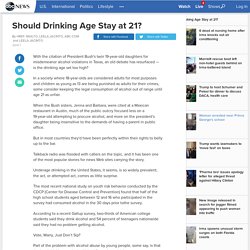
In a society where 18-year-olds are considered adults for most purposes and children as young as 13 are being punished as adults for their crimes, some consider keeping the legal consumption of alcohol out of range until age 21 as unfair. The Legal Drinking Age: 18, 21, or 25? Debates over the age of legal drinking in the U.S. are a common occurrence, especially at times of the year when it comes into the spotlight, like during spring break and around graduation.
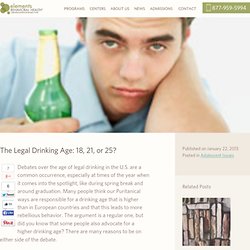
Many people think our Puritanical ways are responsible for a drinking age that is higher than in European countries and that this leads to more rebellious behavior. Black Women in Media: Portrayed as Gold Diggers, Jezebels and Baby Mamas? Generic image (Thinkstock) In the media, "negative imagery of Black women is seen often twice as frequently as positive imagery," according to a survey of more than 1,200 respondents appearing in the November issue of Essence magazine.
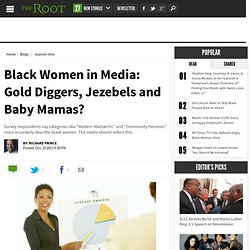
They "told us that the images we encounter regularly on TV, in social media, in music videos and from other outlets are overwhelmingly negative and fall into categories that make us cringe -- Gold Diggers, Modern Jezebels, Baby Mamas, Uneducated Sisters, Ratchet Women, Angry Black Women, Mean Black Girls, Unhealthy Black Women, and Black Barbies," Dawnie Walton wrote last week in advance of the issue's appearance on newsstands Friday. "The study also revealed six types we feel we don't see enough in media, types we feel more genuinely reflect us and the Black women we know: Young Phenoms, Real Beauties, Individualists, Community Heroines, Girls Next Door and Modern Matriarchs. . . .
" When Will The Media Start Portraying Black Women Without Betraying Them? Lakesia Johnson’s new book Iconic highlights how negative stereotypes have followed black women from Sojourner Truth to Gabby Douglas, and shows how the black community can be among the worst perpetrators of negativity.
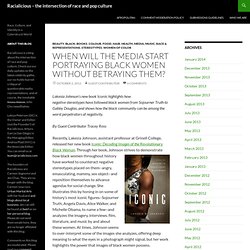
By Guest Contributor Tracey Ross Recently, Lakesia Johnson, assistant professor at Grinell College, released her new book Iconic: Decoding Images of the Revolutionary Black Woman. Through her book, Johnson strives to demonstrate how black women throughout history have worked to counteract negative stereotypes placed on them–angry, emasculating, mammy, sex object–and reposition themselves to advance agendas for social change. Black women portrayed negatively in media.
On the surface, it might appear that many black women have achieved the American dream — excelling in politics, business, academia and media. But when you think of media portrayals of black women, these images don’t quite come to mind. Instead, labels seen most include baby mommas, gold diggers and homewreckers. A survey, published in the November issue of Essence magazine, found that positive images of black women are far less common; even rarer are images of black women as community heroines.
The magazine surveyed 1,200 women. Some these women were asked to keep visual diaries for a week and a half and log the media images of black women they saw. After keeping a diary for the 10-day cycle, the women said they felt saddened, disrespected and that the media failed to represent the women they know. Reality shows such as “Bad Girls Club,” “Love & Hip Hop,” and “Basketball Wives” show negative stereotypical images of black women.